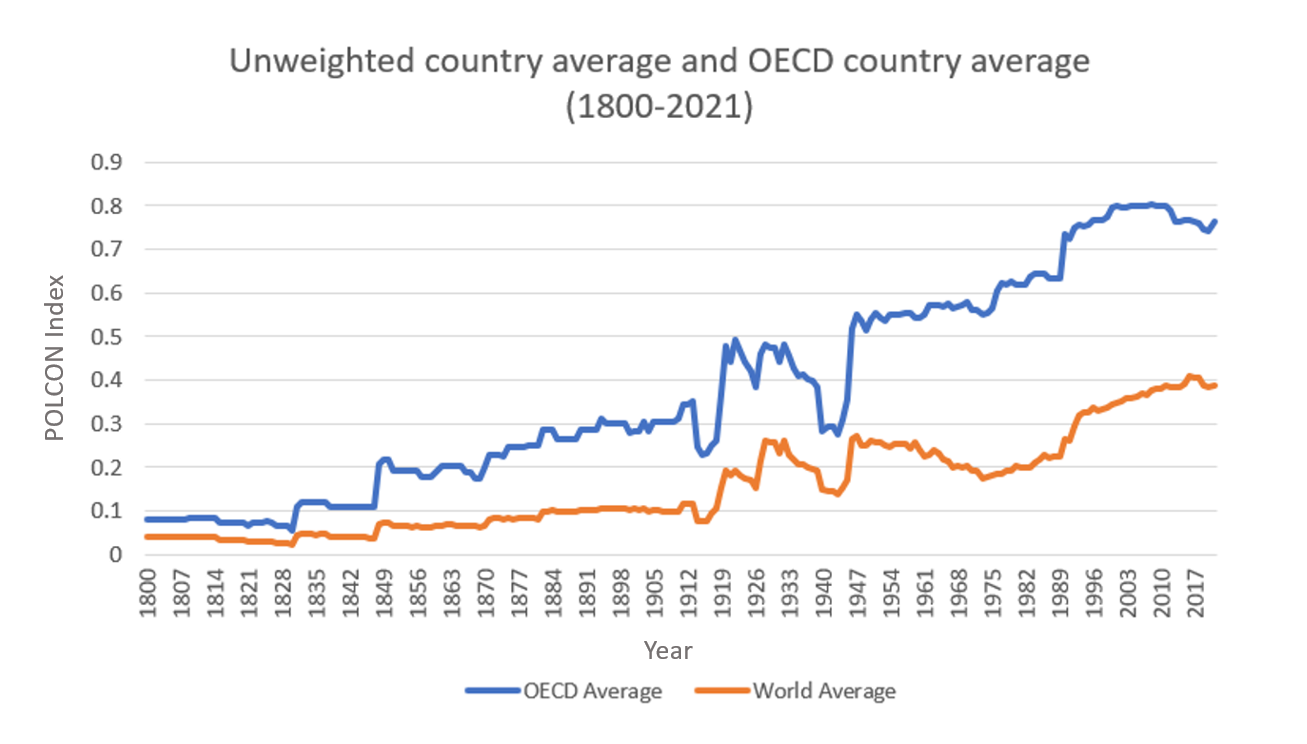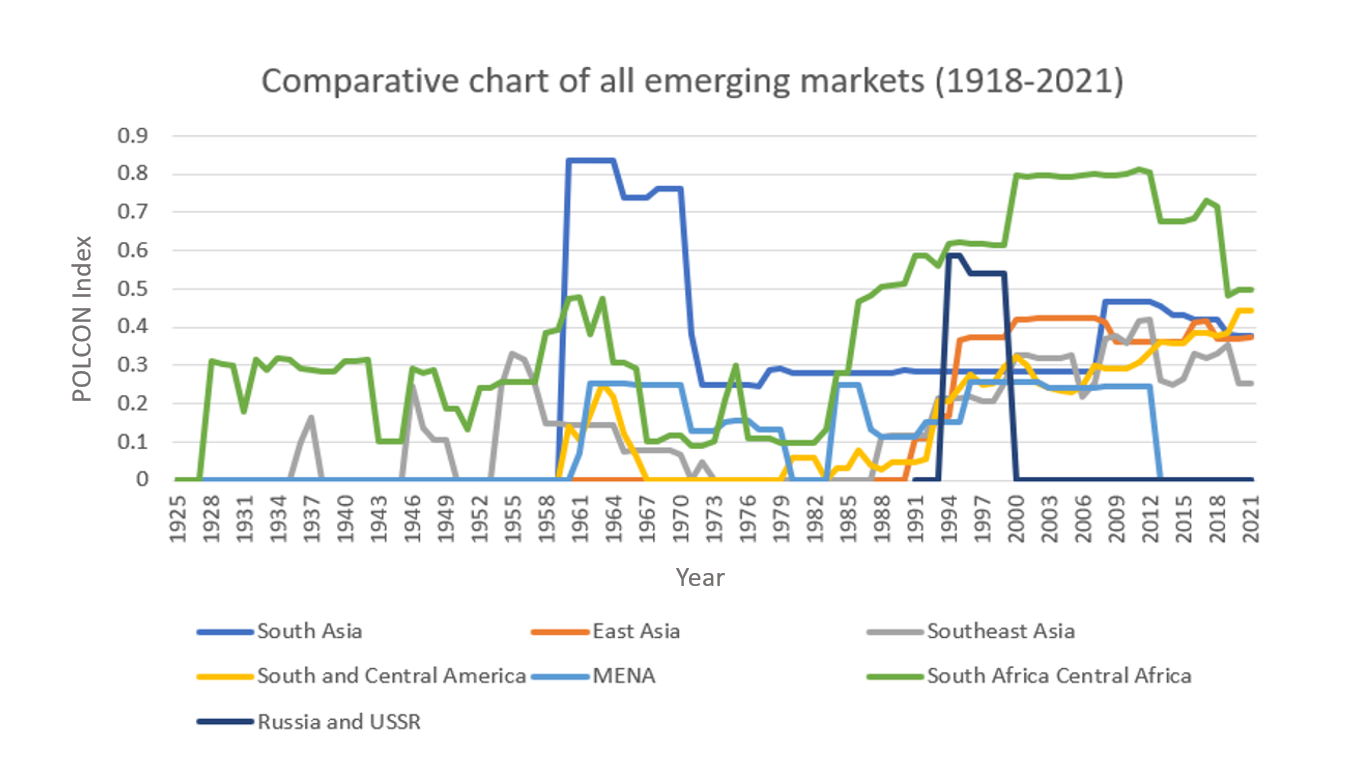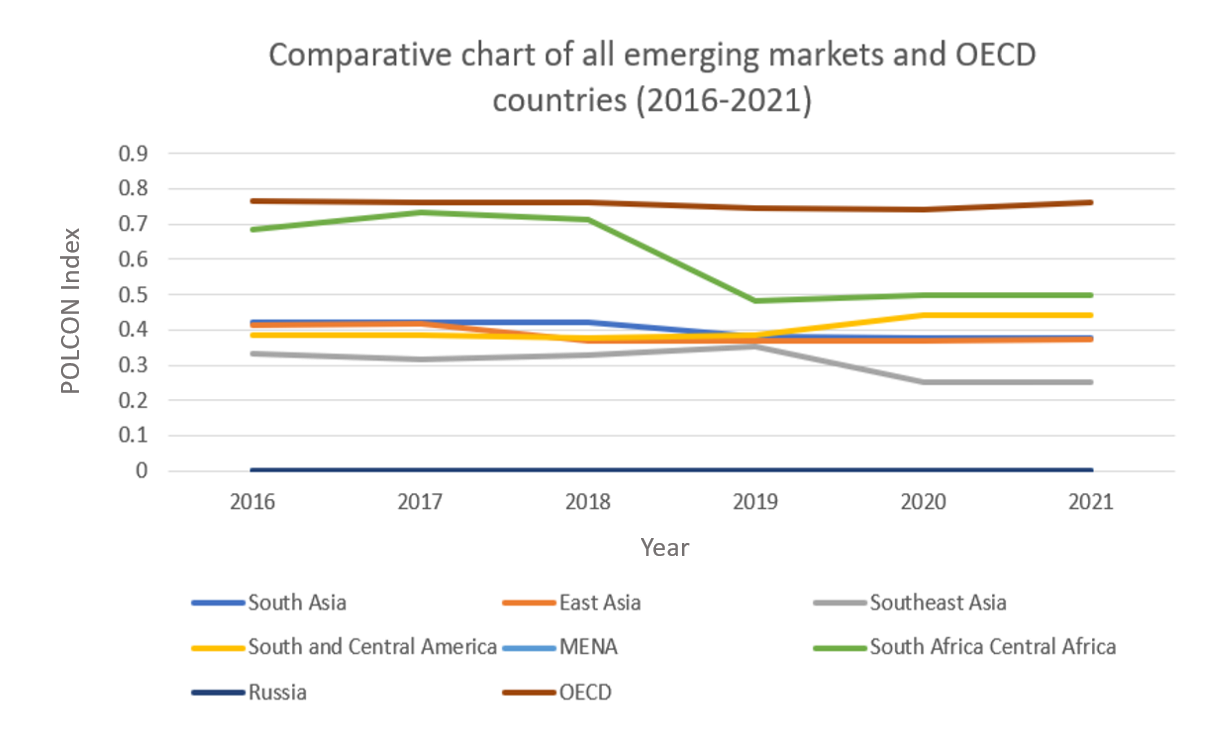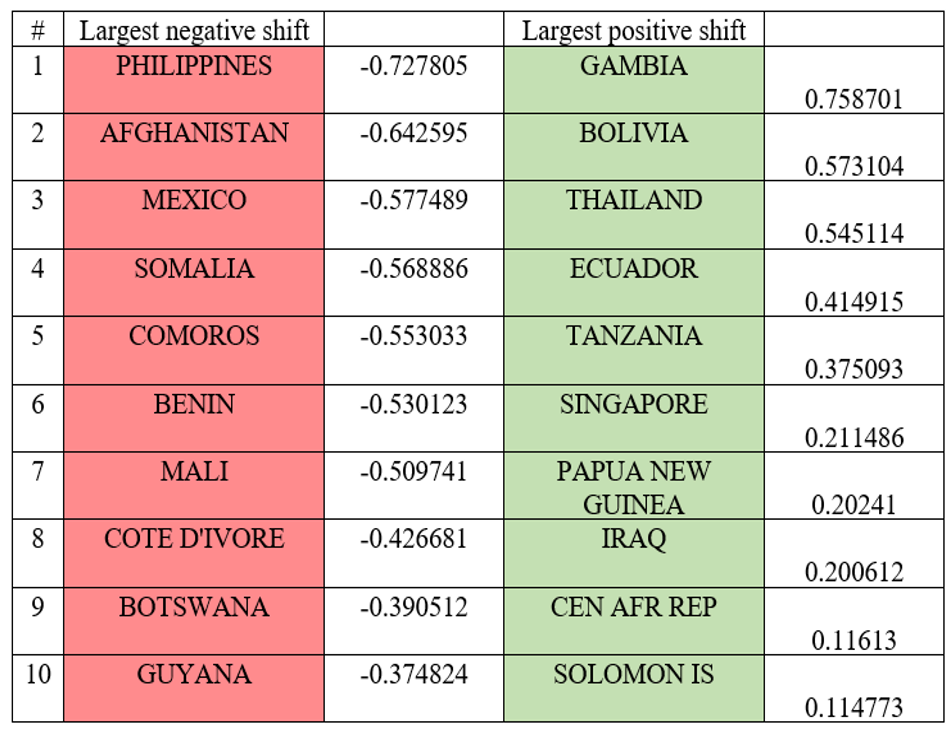The ESG Initiative presents an update to the POLCON dataset
The Wharton Environment, Social and Governance (ESG) Initiative is proud to present an update to the POLCON (POLitical CONstraint) dataset, including new data through the end of the year 2020. The POLCON measure, developed by Vice Dean and Faculty Director of the ESG Initiative Witold Henisz, is a quantitative measure of institutional constraints that uses a spatial model of political interaction and measures the feasibility of a change in policy given the structure of a nation’s political institutions. The measure has been widely used by practitioners and academics in the fields of political science, business, and economics for over 20 years as a measure of checks and balances and institutional rigidity at the country level.
Traditional political risk measurements have been insufficient for several reasons. They have been retrospective and tautological and have been subject to manipulation by political actors whose behavior and actions may be the roots of a country’s problems. These conventional measures lack a focus on the political systems that they seek to measure. Meanwhile, the strength of Henisz’s POLCON lies in its ability to measure the likelihood of changes in policy regimes by deriving the extent to which a political actor is constrained in their choice of future policies.
The POLCON measure is calculated with the following methodology. After assigning countries without effective veto the lowest score, the first step is identifying the number of independent branches of government with veto power over the policy change. The extent of alignment across branches is then taken into account, as alignment increases the feasibility of policy change and reduces the level of political constraints. Then, the extent of preference heterogeneity within legislative branches is captured, as greater heterogeneity increases the costs of overturning policy for aligned branches and decreases costs for opposed branches. This final measure is a numeric score that ranges from zero (most hazardous and fewer constraints, leading to greater unpredictability) to one (least hazardous and more constraints, leading to more predictability).
Since 1800, there has been a very clear rise in the POLCON score, with major shifts occurring in post-conflictual periods such as after drops in the late-1910s and the mid-1940s. In other words, countries are experiencing higher levels of institutional checks and balances and providing safer political environments for investors. The trend for Organization for Economic Cooperation and Development (OECD) countries is significantly more linear, with the 1960s and 1970s seeing major changes for non-OECD countries (Fig. 1). In the 2020s, the variable has reached stagnation around 0.75 for OECD countries and 0.4 for the worldwide average.

Comparatively, POLCON scores for emerging markets have demonstrated significant departures between regional trends since the beginning of the 20th century (Fig. 2).

Given that data availability only began in 1928 in South and Central Africa, data on emerging markets is plotted beginning in 1918. Although the data is impacted by the strictly authoritarian Chinese state, the economic growth of the 1990s correlates with a rapid rise in the POLCON variable in East Asia. Southeast Asia, on the other hand, sees a variety of political shifts, particularly in the post-colonial period, as well as a shift towards leadership without any formal checks and balances in the 1970s and 1980s. Data from South Asia is only available from 1960, but reflects a period of political stability with low POLCON values from the 1970s to the mid-2000s. Even today, the region scores low, around 0.4.
South and Central America reflects a dynamic POLCON variable since the 1920s, a period of economic growth and increased US governmental involvement after the war. The emerging markets of the Middle East and North Africa remained significantly non-democratic until 1960, with dramatic shifts in political constraints in the early 1980s and the mid-2010s. South and Central Africa showed a notable jump in the POLCON variable in the 1960s, which marked a decade of independence across Africa. Following increasing independence and liberalization, the region showed a continuous increase in the variable from the mid-1980s. Lastly, Russia remained an authoritarian state until the fall of the USSR, after which its POLCON variable has once again dropped to 0 under the dictatorial rule of Vladimir Putin.
The new update of the POLCON dataset since 2016 reveals the following general trends. Across the time period, East Asia, South Asia, South and Central America, Russia, and the OECD countries have remained stable in their POLCON variable scores, reflecting no significant changes. Meanwhile, South Africa and Central Africa showed the most change, with a decrease of 0.2 points (Fig. 3).

In particular, in the 2021 update at the country level, many states experienced drastic changes in their POLCON scores, both negatively and positively. The 20 countries featured in Figure 4 faced the most significant shifts in their scores.

In particular, we wish to highlight a few particular case studies to illustrate specific country-level changes in POLCON scores over the past 5-6 years.
The largest negative shift in its POLCON score was faced by the Philippines (-0.73), triggered by the election of Rodrigo Duterte in June 2016. As a candidate, Duterte promised real and rapid improvements in the quality of life by aggressively addressing crime and corruption. However, the reality of his government was one that faced significant democratic backsliding, most notably with a disregard for human rights and the country’s democratic institutions. This significantly contrasted the rule of the prior administration of Benigno Aquino, resulting in a drastic negative fall in the country’s score. Though still plagued by shortcomings such as the struggle with the reduction of poverty or the government’s lack of infrastructural improvements, Aquino’s administration boasted successes such as expanding the fiscal space and social spending, a GDP growth of 6.5 percent, and an overall improvement in the country’s international standing, allowing Aquino to remain popular as a leader. Meanwhile, Duterte’s strong prioritization and hardline stance on the war on drugs lead to the deaths of between 6,000 and 12,000 people and numerous human rights violations, contributing to the destabilization of the country and a significant increase in investment risk.
Mexico also saw one of the highest decreases in its POLCON score (-0.58), sliding towards an increasingly hazardous political environment with few checks and balances. Since the late 1980s, Mexico was ruled by the PRI (Institutional Revolutionary Party) – PAN (National Action Party) coalition, a center-right conservative government, and gave rise to an era of neoliberalism with increasingly higher socioeconomic inequalities and highly concentrated power in the hands of the ruling parties. In 2018, the government experienced reform with the election of president Andrés Manuel López Obrador, who promised a stronger national emphasis on the war on drugs, human rights, and a transitional justice system. However, upon election, Mexico’s government only slid further into autocracy, with the military gaining considerable judicial strength within the government structure and promoting increases in mass violence and selective violence against opposition forces.
Meanwhile, Gambia showed an example of the largest positive shift in its POLCON score (+ 0.76), stemming from the election of Adama Barrow as president in December 2016. His election marked the end of the two-decade rule of former military and autocratic leader Yahya Jammeh. Jammeh’s presidency was marked by the authoritarian oppression of anti-government journalists, the suppression of women’s and LGBT rights, and numerous human rights abuses, including the shooting of 14 students and a journalist in 2000. Meanwhile, Barrow’s election promoted greater democratic governance since 2016. He vouched for freedom of the press, the release of people detained without trial under Jammeh, and abolished the death penalty within a year of assuming office.


